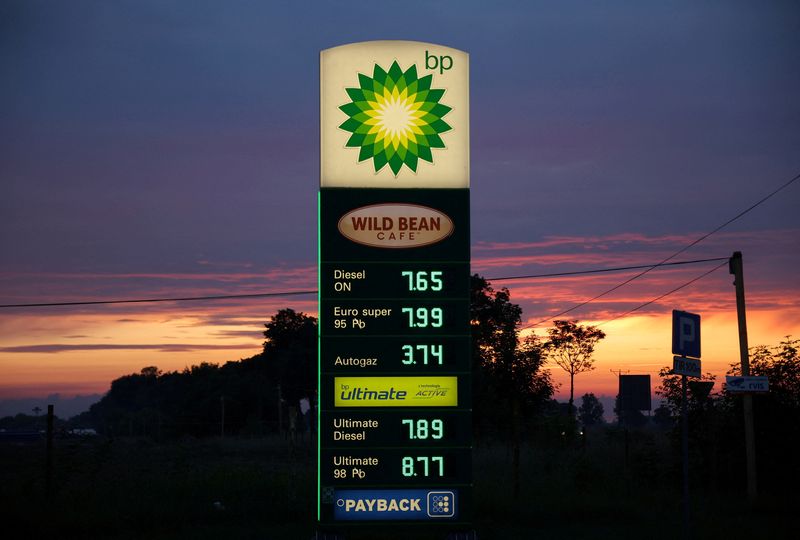By Ron Bousso
LONDON (Reuters) -Major energy companies are set to borrow billions to maintain shareholder payouts or cut the rate of share repurchases in the face of a drop in oil prices after more than two years of bumper profits, analysts said.
The majors have for decades attracted investors by promising steady payouts even as the transition to lower carbon energy has cast doubt over the industry's long-term prospects.
BP (LON:BP), Chevron (NYSE:CVX), Exxon Mobil (NYSE:XOM), Shell (LON:RDSa) and France's TotalEnergies (EPA:TTEF) have paid investors more than $272 billion in dividends and share repurchases since the start of 2022.
Energy prices surged after Russia invaded Ukraine in February 2022 and as the global economy emerged from the pandemic, generating record profits for the energy industry.
The payout has since been almost double the rate over the previous 10 quarters, Reuters calculations found.
But a drop in benchmark crude oil prices to below $70 a barrel last month, their lowest since late 2021, coupled with a sharp decline in profits for refining oil into fuels, is set to cut earnings in the coming quarters.
LOST YEAR?
Several banks have in recent weeks cut oil price forecasts in response to a weak demand outlook and trimmed profits forecasts for the sector.
"With moderating oil prices and weak refining margins, 2025 could be seen as a lost year for the sector," RBC (TSX:RY) Capital Markets analyst Biraj Borkhataria said.
Exxon, Chevron, Shell and TotalEnergies are expected to hold share repurchases flat throughout next year, and Borkhataria said they may resort to borrowing money to cover shortfalls when interest rates are still high.
He said to maintain buybacks at their 2024 levels next year, based on RBC's oil price forecast, Chevron would need to borrow next year $8.6 billion, Exxon $5.1 billion, TotalEnergies $5.6 billion, Shell $3.8 billion and BP $3.1 billion.
BP, which has higher debt than its rivals, is however likely to slow the pace of buybacks, while returns from Italian energy company Eni will depend on the scale of its asset sales, Borkhataria added.
"The difference in your ability to maintain the distributions is how strong your balance sheet is today, and how willing are you to re-lever in order to maintain distributions," Borkhataria said.
UBS analyst Joshua Stone expects BP to cut its rate of buybacks to $4 billion in 2025 from $7 billion this year, based on an average crude price of $75 a barrel. Shell would reduce the rate of buybacks by $1.5 billion to $12.5 billion while TotalEnergies should be able to maintain its rate of $8 billion, Stone added.
"The reality is that buybacks should slow more materially if prices fall below $70 a barrel," Stone said.
TOUGH CHOICES
In its second quarter results in August, BP said that in current market conditions it planned to buy back at least $14 billion through 2025 as part of its commitment to return 80% of surplus cash to shareholders.
With a net debt of $22.6 billion at the end of June and a market capitalisation of $85 billion, BP has the highest debt ratio among the oil majors, according to LSEG data.
A BP spokesperson said its returns guidance remains unchanged and that it maintains a disciplined financial frame.
Chevron said its low debt level, strong credit rating and significant cashflow growth in the coming years "are all assets that allow us to offer differentiated shareholder returns through volatile commodity cycles".
Shell declined to comment. Exxon and TotalEnergies had no immediate comment when asked about their planned shareholder returns.
Some have already tapped into cash reserves to stick to their return promises. Chevron, for example, paid $6 billion to investors in the second quarter of the year, when its net earnings reached $4.4 billion while its debt rose by around $2.5 billion from the previous quarter.
Morgan Stanley (NYSE:MS) analysts in late August lowered their earnings forecast for the sector saying "share buybacks are maxed out for now".
Investment bank Jefferies lowered its oil price assumption for the remainder of 2024 and 2025 and said it expects the sector's earnings to decrease by around 22% in the third quarter compared to the previous three months.

Companies will try to maintain returns by cutting spending, primarily on investments in low carbon energy, and by borrowing, Jefferies analyst Giacomo Romeo said.
"Companies will have to face some tough choices in the coming months if macro prices don't recover," he added.